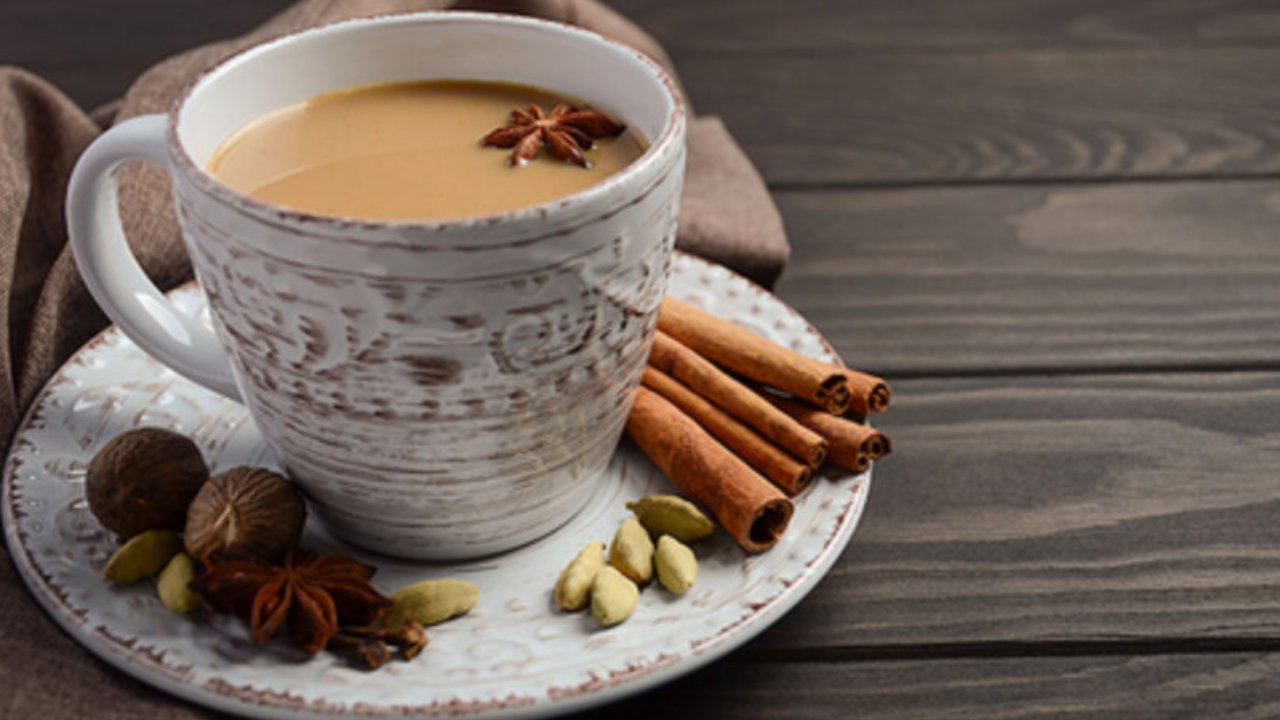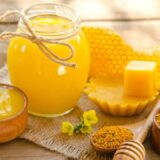Top 10 Health Benefits & Advantages of Chai Tea for Weight
Chai tea is a traditional spiced beverage that originated in India, known for its aromatic blend of black tea, milk, sugar, and an assortment of spices, including cinnamon, ginger, cardamom, cloves, and black pepper. The word “chai” itself simply means “tea” in Hindi, but the specific preparation of chai has become synonymous with a unique, flavorful experience.
Over the years, chai has evolved into a global sensation, with variations made to suit different tastes and preferences, yet the heart of the drink remains the same—an enticing combination of bold spices and smooth tea. Chai tea is not only beloved for its rich and complex taste but also for its potential health benefits. Its combination of spices offers a range of advantages, particularly in promoting digestive health, boosting the immune system, and aiding in weight loss.
The warmth and flavor make it a comforting drink, while its healthful properties have made it a staple for many who seek a delicious way to enhance their well-being. The presence of black tea provides a natural caffeine boost, making it a great alternative to coffee for those looking to avoid the jitters.
The spices in chai offer additional therapeutic benefits that can support both physical and mental health. Whether consumed as a morning energizer or an afternoon treat, chai tea remains a cherished and holistic beverage that connects tradition with wellness.
What Exactly is Chai Tea?
Chai tea is a traditional, spiced tea made with a blend of ingredients like ginger, cloves, cinnamon, cardamom, and black pepper, creating a unique and flavorful drink. While black tea is typically used as the base, recipes can vary depending on the spices and their proportions. Each spice adds its own distinct taste and health benefits, making chai tea both comforting and therapeutic. Preparing chai is an art, requiring skill to balance the spices and create the perfect brew.
Ingredients for Chai Tea
The common ingredients in chai tea include:
- Black Tea – The base of chai, providing caffeine and a robust flavor.
- Milk – Traditionally added to create a creamy texture, but can be substituted with dairy-free alternatives like almond, oat, or coconut milk.
- Sugar – Often used to sweeten the tea, though it can be adjusted or substituted with natural sweeteners like honey, stevia, or maple syrup.
- Cardamom – A key spice in chai, providing a sweet, aromatic flavor with subtle citrus notes.
- Cinnamon – Adds warmth and sweetness with its distinct spicy, woody flavor.
- Ginger – Known for its spicy and slightly tangy kick, ginger also provides digestive benefits.
- Cloves – Contribute a rich, aromatic, and slightly sweet flavor, enhancing chai’s depth.
- Black Pepper – Adds a bit of heat and spice, balancing the sweetness of other ingredients.
These ingredients come together to create chai’s distinctive and comforting flavor, with each spice contributing its unique health benefits.
Chai Tea Nutrition
Chai tea is packed with antioxidants such as catechins and theaflavins, which help combat oxidative stress and may contribute to reducing the risk of chronic conditions like cancer. The various spices used in chai, along with the black tea base, also provide additional health benefits.
Depending on how it’s prepared, chai tea can provide essential nutrients such as:
- Calcium
- Manganese
- Potassium
- Vitamin K
When brewed without sweeteners or milk, a cup of unsweetened chai tea made with just water contains:
- 0 calories
- 0 grams of protein
- 0 grams of fat
- 0 grams of carbohydrates
- 0 grams of fiber
- 0 grams of sugar
How Much Caffeine is in Chai?
The caffeine content in chai tea varies depending on the brand and how it’s made. On average, an 8-ounce serving of chai tea contains around:
- 40 milligrams of caffeine for tea bag varieties
- Up to 61 milligrams of caffeine for concentrates
This caffeine content is similar to other types of black or green tea, making chai a moderate source of caffeine, ideal for those looking for a gentler energy boost.
Top 10 benefits & advantages of chai tea for weight
Chai tea can be a helpful addition to a weight loss regimen for several reasons. Here’s how its ingredients contribute to weight loss:
1. Boosts Metabolism
The spices in chai tea, especially ginger and cinnamon, help increase the metabolic rate. Ginger stimulates digestion and thermogenesis, which is the process of burning calories to produce heat, while cinnamon regulates blood sugar and insulin, preventing fat storage. The caffeine in black tea also gives a natural boost to metabolism, aiding in fat burning.
2. Curbs Appetite
Chai tea helps control hunger and cravings, primarily due to the effects of cinnamon and ginger. Cinnamon helps stabilize blood sugar levels, preventing spikes and crashes that lead to cravings, while ginger promotes satiety, reducing the likelihood of overeating.
3. Supports Fat Burning
Ingredients like cinnamon and black pepper in chai tea help regulate blood sugar and improve fat-burning processes. Cinnamon enhances insulin sensitivity, while black pepper contains piperine, which has been shown to increase fat metabolism, helping your body burn fat more effectively.
4. Reduces Inflammation
Chronic inflammation can slow down metabolism and contribute to weight gain. The anti-inflammatory properties of chai’s spices like ginger, cinnamon, and cloves help reduce inflammation, improving metabolic health and supporting weight loss.
5. Improves Digestion
Ginger and cardamom in chai tea help improve digestion, reduce bloating, and promote a healthy gut. A healthy digestive system ensures that nutrients are absorbed efficiently and waste is eliminated properly, which can indirectly support weight loss by improving overall bodily function.
6. Controls Blood Sugar
Stable blood sugar levels are crucial for weight management. The cinnamon and ginger in chai tea help regulate insulin and blood sugar levels, preventing spikes that can lead to fat storage and unhealthy cravings. By keeping blood sugar levels steady, chai tea helps manage hunger and support fat loss.
7. Increases Hydration
Staying hydrated is essential for maintaining a healthy metabolism. Chai tea is a hydrating beverage that supports metabolic function and fat burning. Proper hydration helps the body perform optimally, including the processes related to weight loss.
Tips: Incorporating chai tea into your daily routine can help with weight loss by promoting a faster metabolism, reducing appetite, improving digestion, and enhancing fat-burning processes.
It’s a flavorful, comforting beverage that works in tandem with other healthy habits to support your weight management goals.
How to Make Chai Tea
The preparation of chai tea can vary depending on the form you choose to use, such as loose-leaf tea, tea bags, concentrates, or powders. Here’s a breakdown of how to make chai tea from each type:
Loose-leaf Tea and Tea Bags
- Tea Bags: To brew chai tea with a tea bag, simply boil water and steep the tea bag in the water for about 5 minutes, allowing it to infuse its flavors.
- Loose-Leaf Tea: For loose-leaf chai tea, use a tea strainer or a tea ball to hold the tea leaves while they steep in the hot water. After steeping for about 5 minutes, remove the strainer or tea ball.
- Milk: After steeping, you can add milk to your chai. The amount of milk varies depending on personal preference—from just a dash to equal parts milk and tea. You can also use dairy-free alternatives like almond or oat milk.
Concentrates and Powders
- Chai Tea Concentrate: Chai concentrate is a pre-brewed liquid form of chai tea that often includes added sugar. To make chai, mix equal parts chai concentrate with milk (or a milk substitute). This can be enjoyed hot, iced, or steamed.
- Chai Tea Powder: Chai tea powder can be added to hot water or milk. Simply mix the desired amount of powder with your liquid and stir until it’s well combined. Keep in mind that powdered chai teas can sometimes be highly processed and may contain added sugars or preservatives.
Each method offers a unique way to enjoy chai tea, whether you’re looking for a quick and easy option or a more traditional, flavorful brew.
Amazing Facts About Chai Tea
- Over 5,000 Years of History: Chai tea has been enjoyed in India for over 5,000 years, originally created as a health elixir by ancient Indian royalty.
- Ayurvedic Roots: The spices in chai tea are based on Ayurvedic principles, which believe each spice balances different elements of the body and mind.
- Spiced for Health: Ingredients like ginger, cardamom, and cinnamon are chosen not only for flavor but for their medicinal properties, supporting digestion, immunity, and overall well-being.
- A Symbol of Hospitality: Chai tea is a symbol of hospitality in Indian culture. It’s often served to guests as a gesture of warmth and welcome.
- A Cultural Staple: Chai is an integral part of daily life in India, enjoyed by millions at home, on the streets from tea vendors, and in social gatherings.
- Customizable: Chai tea is highly versatile and can be made with various spices, milk types, and sweetness levels, making it suitable for many preferences and dietary needs.
Side Effects of Chai Tea
While chai tea offers numerous health benefits, there are a few potential side effects to be aware of, especially when consuming pre-made or packaged chai drinks.
High Sugar Content: Many packaged chai tea mixes or pre-made concentrates can contain high levels of added sugar and dairy. Some chai concentrates can have up to 24 grams of sugar per serving, which is close to or exceeds the daily recommended sugar intake for adults. The American Heart Association recommends a daily sugar intake limit of 24 grams for women and 36 grams for men. Consuming a chai concentrate with added sugar could quickly meet or exceed these limits.
To maximize the health benefits of chai, it’s important to check nutrition labels carefully. For a healthier option, consider making chai tea at home or choosing unsweetened varieties to avoid excess sugar.
Caffeine Content: Although chai tea has less caffeine than coffee, it still contains a moderate amount. A typical serving of black tea-based chai contains about 30-50 milligrams of caffeine, which is about half the amount found in a cup of coffee. The FDA states that up to 400 milligrams of caffeine per day is generally safe for healthy adults (around four cups of coffee). However, consuming too much caffeine can lead to side effects such as:
- Headaches
- Jitters
- Sleeplessness
- Upset stomach
If you experience any of these symptoms from drinking chai tea, or if you are sensitive to caffeine, consider switching to decaffeinated chai or consulting your doctor to determine the best option for you.
FAQ’s
1. What are the ingredients for chai tea?
Chai tea typically includes black tea, milk (or a dairy-free alternative), sugar, and a blend of spices like cardamom, cinnamon, ginger, cloves, and black pepper.
2. What is the composition of chai tea?
The composition of chai tea consists of a strong base of black tea, combined with milk and sweetener, and flavored with spices such as cardamom, cinnamon, ginger, cloves, and black pepper.
3. What are the ingredients in a chai beverage?
A chai beverage generally contains black tea, milk (or an alternative), sugar or sweetener, and a mix of spices like cardamom, cinnamon, cloves, ginger, and black pepper.
4. What are the ingredients in Chaiiwala chai tea?
Chaiiwala chai tea ingredients are similar to traditional masala chai, with black tea, milk, sugar, and a special blend of spices like cardamom, cinnamon, and ginger. Some variations may also include other spices like cloves and black pepper.
5. What are the main ingredients in tea?
The main ingredients in tea typically include tea leaves (black, green, or herbal) and water. Additional ingredients like milk, sugar, and spices are added depending on the type of tea, such as chai.
6. What is a dirty chai drink?
A dirty chai drink is a combination of chai tea and espresso. It blends the warming spices of chai with the bold flavor of coffee, creating a rich and energizing beverage.
7. How to make perfect chai?
To make perfect chai, boil water with a mixture of spices like cardamom, cinnamon, and ginger. Add black tea leaves and let it steep. Then, pour in milk and sugar to taste, and let it simmer for a few minutes before straining and serving.
8. What are the ingredients in Lipton chai tea?
Lipton chai tea typically contains black tea leaves, along with spices such as cinnamon, cardamom, ginger, and cloves. It may also include added sweeteners and flavoring agents in some pre-brewed options.
9. How to make 2 cups of chai?
To make 2 cups of chai, use 1 cup of water and 1 cup of milk. Add a teaspoon of black tea leaves, and spices like cardamom, cinnamon, and ginger. Bring to a boil, let it simmer for 5-7 minutes, then strain and serve with sugar or sweetener to taste.
10. What are the ingredients for masala chai?
Masala chai typically includes black tea, milk, sugar, and a blend of spices such as cardamom, cinnamon, ginger, cloves, and black pepper. These ingredients combine to create the signature spiced flavor of masala chai.
11. What exactly is in chai?
Chai is a spiced tea made from black tea, milk, sweetener, and a mix of spices like cardamom, cinnamon, ginger, cloves, and black pepper, depending on the recipe.
12. How to make chai with milk?
To make chai with milk, boil water with spices like cardamom, cinnamon, and ginger. Add black tea leaves and let it steep. Pour in milk, bring it to a boil, and simmer for a few minutes. Strain the chai and sweeten it to taste before serving.
Chai tea is more than just a flavorful beverage; it’s a rich cultural tradition that has been enjoyed for thousands of years. With its blend of aromatic spices, black tea, and milk, chai not only provides a delicious and comforting experience but also offers numerous health benefits
Resources
- Antioxidants from black and green tea: from dietary modulation of oxidative stress to pharmacological mechanisms(1)
- Cinnamon: A Multifaceted Medicinal Plant(2)
- Effects of ginger on gastric emptying and motility in healthy humans(3)
- Black tea improves attention and self-reported alertness(4)
- Study of nutritional value of dried tea leaves and infusions of black, green and white teas from Chinese plantations(5)
- Anti-inflammatory activity of cinnamon (C. zeylanicum and C. cassia) extracts – identification of E-cinnamaldehyde and o-methoxy cinnamaldehyde as the most potent bioactive compounds(6)
- Evaluation of anti-inflammatory effects of green tea and black tea: A comparative in vitro study(7)























